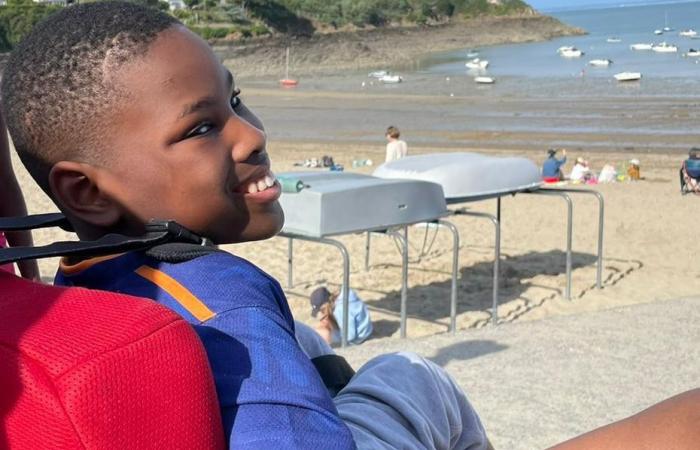The Telethon launches this Friday. Objective: collect donations to finance scientific research into rare diseases, some of which remain little known to scientists. Alexandre, disabled, fights against an unnamed illness. His mother calls on the scientific community for help.
Company
From daily life to major issues, discover the subjects that make up local society, such as justice, education, health and family.
France Télévisions uses your email address to send you the “Society” newsletter. You can unsubscribe at any time via the link at the bottom of this newsletter. Our privacy policy
For many illnesses or disabilities, scientific research is progressing. It makes it possible to find treatments and care for many children. But what happens when a disease is so rare that it doesn't have a name? When scientists cannot yet determine where it comes from and how it evolves?
Alexandre, 13, suffers from a rare disease. He suffers from muscle stiffness and hip pain. A daily challenge for Sandra Senou, Alexandre's mother.
This mother is appealing to the scientific community and the Telethon for donations so that research into her son Alexandre's illness is better known and treated.
Alexander was born premature. As soon as he was born, complications began for his parents. “He had spasms and stiffness in his legs.“, remembers his mother. The doctors then diagnosed him with severe dystonia which explains the significant stiffness. However, for her son's other pathologies, Sandra Senou who lives in Eragny-sur-Oise remains without a medical answer. “We were initially told he had cerebral palsy, but further tests later revealed he was not BMI.”
For the family, a long fight begins. “The genetic tests yield nothing, but we realize that Alexandre is losing autonomy over the years.“In fact, although his son was able to walk when he was little, at 13, he has difficulty sitting still.
“He is in an electric wheelchair, the pain is getting worse and worse.“, regrets the mother. She fears that her son's illness will only get worse. “We don't know if it's degenerative. What we see is that his difficulties accumulate. Since a hip dislocation in 2019, the situation is serious and it is not known where the disease will end.”
Alexandre suffers from significant hip pain.
•
© Sandra Senou
Due to his disability, Alexandre is often hospitalized. “This impacts our family life, because as soon as we get home from work, we go to help him at the hospital. He needs us“The teenager can also no longer attend school normally due to various hospitalizations.”He has 4 hours of lessons per week. It's better than nothing, but it's not enough“, deplores Sandra Senou.
More broadly, she worries about her son's future. “If we do not have an answer to the origin and evolution of his illness, it is difficult to predict what our son will become..”
To understand her son's disability, she calls for scientific research and in particular the Telethon. “We need help to relieve it on a daily basis.” She believes that “If research advances on his illness, we will be able to prepare for my son's future more peacefully. We will be able to have the treatments to relieve his pain and maybe one day he will be able to get out of his electric wheelchair and walk again“.
Today, Alexander disease is so rare that it has no scientific name. “Doctors say there are only a few cases worldwide and research on the subject is in its early stages“, explains Sandra Senou.
On Instagram, she calls on research associations and the Telethon to advance scientific knowledge of Alexander disease. “We are doing the maximum in terms of drug treatment for his age and an operation would be very risky because of his dystonia. We are without a solution.“In her cry for help, the mother indicates that she wants her son”have the normal life of a 13 year old child“.
Research into rare diseases is one of the objectives of the Telethon. “Every day we discover new diseases with previously unknown gene mutations“, indicates Jean-François Briand, director of operations and scientific innovations for the AFM-Téléthon.
According to the researcher, for many of these diseases “the first diagnoses remain presumptive diagnoses and it is difficult to be precise given the few cases recorded.” He explains that the case of Alexandre and his mother is not an isolated case and that the association “receives numerous calls about illnesses with diagnostic errors“.
He notes that donations from the public this weekend will be used in part to finance “teams of researchers working on these rare diseases. They try to get to know them better in the hope of finding a treatment in order to be able to support the families as best as possible.“.
Finally, the biology researcher believes that donations also make it possible to refine certain diagnoses on already known diseases. “Some people have benefited from an initial diagnosis of their illness. With advances in research, it has been revised and refined because medicine evolves. Their illness could therefore be better treated.”
To help the research and make a donation, you can call 3637 or go to the AFM TELETHON website.






